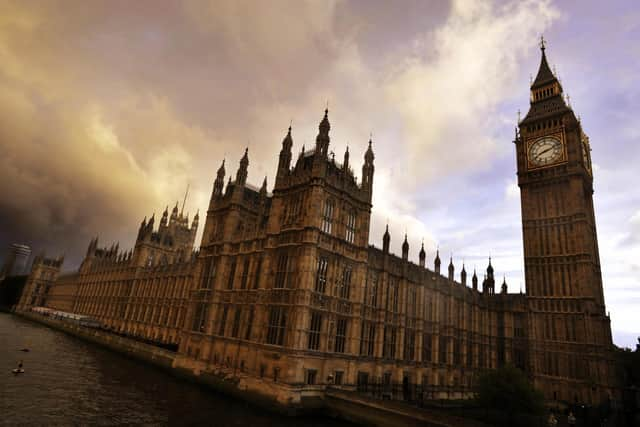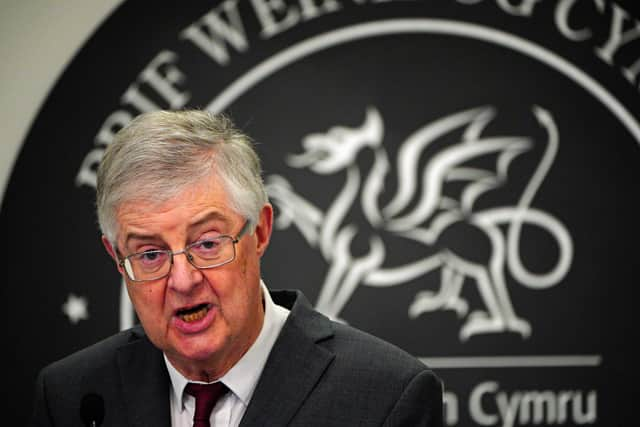Why Scotland's problem isn’t with vast majority of English people - Gordon Brown
A new survey of Scottish attitudes to England and Wales reveals the extent to which Scots feel close bonds with England’s north east, the north west, the people of the Midlands and with Wales – and how they feel they share the same progressive values and an equal desire for change.
In the survey being published today, altogether 59 per cent of Scots say they have common bonds with Geordies, and only 21 per cent do not. That figure remains high for Liverpudlians, with 46 per cent sensing common bonds and only 25 a per cent against.
Advertisement
Hide AdAdvertisement
Hide AdIndeed, ask Scots about their common bonds with everyone in the Midlands, the north of England and Wales, and the figure is high – half of Scots (49 per cent) feel they have such strong bonds, and only 23 per cent say they do not.


The same results are repeated when we ask whether Scots feel they have similar values to people in the north and Midlands and Wales. It suggests that solidarity, co-operation and sharing between the different parts of our country matter far more than people have imagined.
In other words, Scotland’s problem isn’t with the vast majority of the English people. The problem is with London, more accurately with the over-concentration of power in Whitehall and Westminster.
Our survey found only 17 per cent of Scots felt they have common bonds with London with a huge 65 per cent against. This antipathy towards London mismanagement is what pulls down our sense of commonality with England more generally. When we posed the question about English people in general, only 33 per cent of Scots said they felt common bonds, compared to 52 per cent who said they did not.
The survey is published in the week that Welsh First Minister Mark Drakeford, Manchester Mayor Andy Burnham and West Yorkshire Mayor Tracy Brabin are coming to Scotland to speak at a major rally in Edinburgh. Together with Anas Sarwar the Scottish Labour leader and myself, we want to set out what we have in common and lay out a new plan for a stronger and fairer Scotland in a changed and better Britain.


Westminster and Whitehall have yet to catch up with these sentiments, which show a common desire for change. And this recognition of what we have in common with Wales and the regions is a strong counterweight to all those who say Scots have little in common with their southern neighbours and that you have to be Scottish or British, but cannot be both.
At the event, organised by the Our Scottish Future organisation founded three years ago, we will come together to explain why each of us want radical change in Britain – from the abolition of the decrepit House of Lords, to creating radical new centres of economic power and initiative all across the United Kingdom. These changes are along the lines set out in the Labour party's commission on the future of Britain that I had the privilege to chair.
We will be able to show that far from moving apart, leaders from different parts of the UK are ready to come together to demand change – not just in who runs the country, but how it is run too.
I believe these findings tell us two big things.


Advertisement
Hide AdAdvertisement
Hide AdFirstly, they show that the SNP position – that Scotland and England are travelling in opposite directions with very different sets of values – is out of tune with the times. This isn’t a case of “progressive” Scotland on one side and “conservative” England on the other. The reality is that Scotland Wales and most of England share similar values in support of equality and fairness and all want local identities to be recognised.
For what is resurfacing in England’s regions and cities, as it has for decades in Scotland and Wales, is a longing for belonging. For the first time since the 19th century, the distinctive voices of Manchester, Liverpool, Newcastle, Bristol, and Birmingham and the regions are being valued more than those of national politicians. No-one is now talking them down as "provincial".
A UK-wide movement for change is therefore growing, showing Scotland isn’t alone in feeling disillusioned and disconnected with London. Much of England and Wales feels it too.
And the wish for a stronger sense of local identity and place – a programme to ‘take back control’ - is entirely in sync with our own journey in Scotland which, for decades, has likewise demanded an end to centralised rule.


Secondly, I believe the findings propel us to an inevitable answer. There is not just a common UK-wide desire for change, but a clear pathway to delivering it. And it is time to examine the case for working with our friends and allies to reform the broken and out of date over centralised system which lies at the core of so much disillusion – and which needs fixing.
The new post-austerity, post-Brexit, post-Covid Britain outside the narrow confines of London SW1 now needs to have its voice heard.
We need to begin the major reform of Britain so that the way we run ourselves is more democratic, less corrupt, and more responsive to the wishes of people from across our diverse nation.
We desperately need the new modern institutions, reflective of the values we hold, which ensure power is shared across Britain, not handed down from on high. We need Westminster and Whitehall to show more respect to people who, as another survey shows, feel "neglected", "forgotten", "ignored" and patronised as second-class citizens.
Advertisement
Hide AdAdvertisement
Hide AdA new alliance of people from across Scotland, England and Wales demanding change shows we are moving closer together, not further apart. Most of us share similar beliefs not just in equality and in the rule of law but also in tolerance, and in the benefits of diversity.
And these values are reflected in the priorities which Scotland, Wales and England now share in common.


The vast majority of us believe that supporting our NHS, tackling the cost-of-living crisis, delivering strong public services, eradicating poverty and protecting our environment are the issues that matter.
Most of us too now want to see a new Britain emerging that understands that unity does not require uniformity, and that sees diversity not as a threat but as a multinational state’s USP.
For years Scotland has been demanding change, but the SNP have suggested that independence is the only ‘change’ game in town.
Now there is another route to change that is an alternative to the SNP’s policy of total separation. The new Britain that Drakeford, Burnham, Brabin and I will propose will achieve a better balance between the co-operation we need to solve the challenges of the 21st century and the desire for autonomy closer to our homes.
Instead of handing power inside one over-dominant centre, the aim would be to put more power back where it belongs: in the hands of the cities, towns and communities of the land. That is what “taking back control” really means.
What unites the nations and regions is that all of us want change. Indeed I sense that most of Scotland – whether pro-independence or pro-union, whether Yes or No in 2014 – long to find a way forward together. It’s time for a hopeful, realistic, and positive plan for change that will, in so doing, help to bridge the differences between us and re-imagine our country as a force for good.
Comments
Want to join the conversation? Please or to comment on this article.